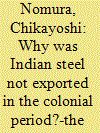| Srl | Item |
| 1 |
ID:
180465


|
|
|
|
|
| Summary/Abstract |
This study focuses on the effects of the United States (U.S.) anti-dumping policy targeting China’s steel products, based on the HS 10-digit code monthly data from 1995 to 2015. It shows that as soon as the U.S. government implemented the affirmative preliminary ruling of an anti-dumping case, the volume of Chinese exports to the U.S. decreased regardless of the outcome of the final ruling. In the meantime, the U.S. imports of the involved products from other competing countries increased. It further finds that China’s exports of the impacted products were diverted to the third-party countries, most of which were developing countries. This finding is contrary to those of studies from other industries such as textiles and agricultural products.
|
|
|
|
|
|
|
|
|
|
|
|
|
|
|
|
| 2 |
ID:
118912


|
|
|
|
|
| Publication |
2012.
|
| Summary/Abstract |
While various scholars of Indian economic history have focused on the progress of import substitution in India after the 1920s, few have studied why this led to hardly any export of industrial products during the colonial period. One of the most probable reasons for the lesser popularity of this issue could be attributed to a commonly shared view that there was less hope for the export of industrial products in colonial India since import substitution had progressed only so far. Although it is accepted that the industrial development of colonial India was generally stagnant, this does not necessarily apply to specific products in specific industries. For instance, the iron and steel industry achieved almost a full self-sufficiency rate for some of its steel products during the 1920s, although the industry hardly exported the products afterward. This paper aims to clarify why hardly any steel of the Tata Iron and Steel Company (TISCO), the only steel producing company with modern technology until the mid-1930s, was exported. A detailed study of the company's archives will show that the steel export of the company was fundamentally hindered by a fact which had its origin in British imperial policy: the strict quality specifications in the production of steel.
|
|
|
|
|
|
|
|
|
|
|
|
|
|
|
|